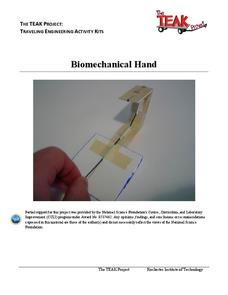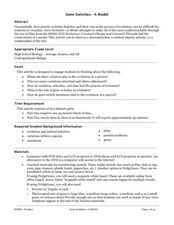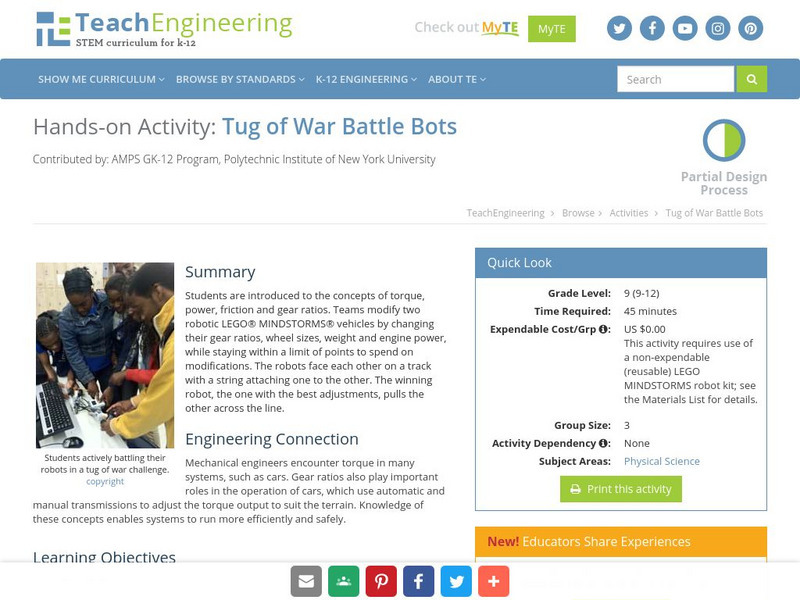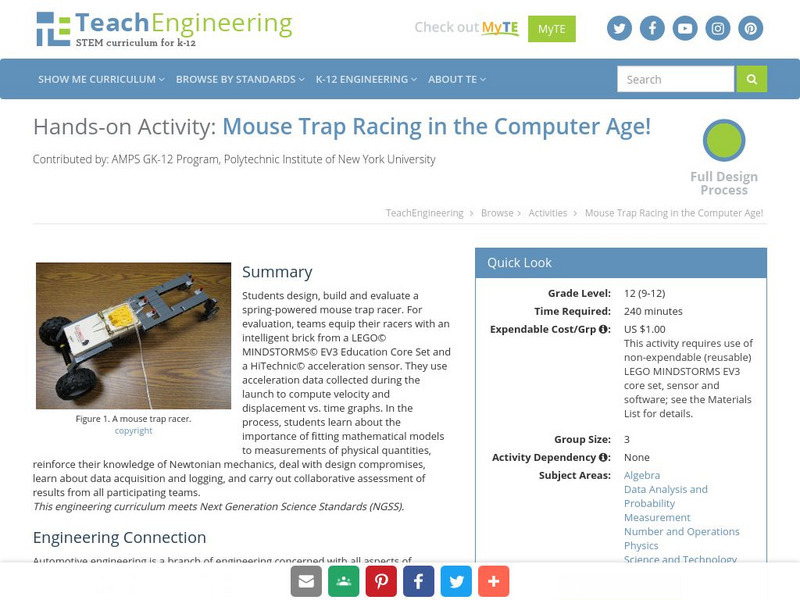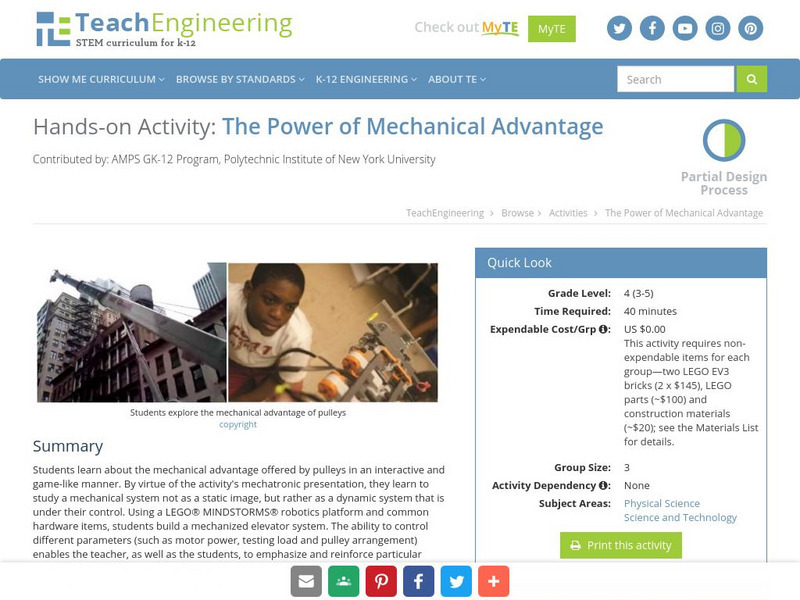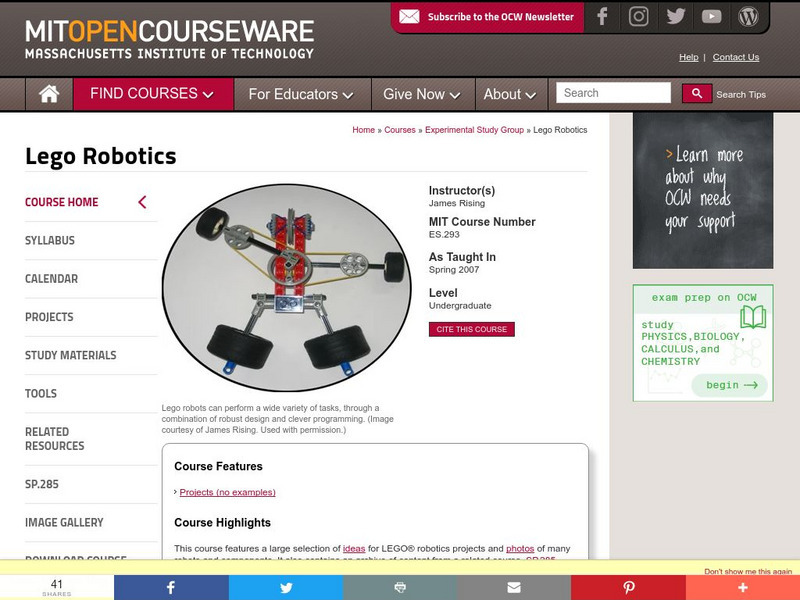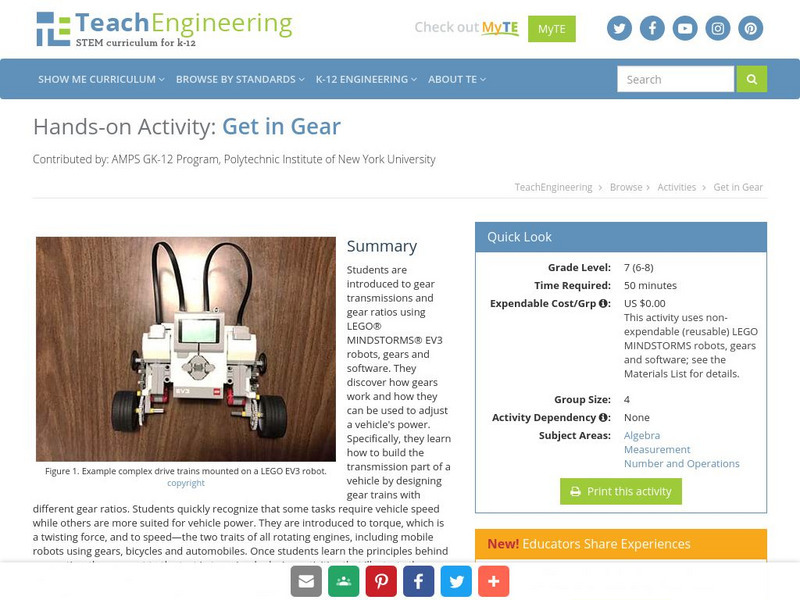NOAA
Oceans of Energy
Are the earth's oceans really just giant batteries, waiting for their energy to be harnessed? Middle school mechanical engineers will be shocked by the amazing amount of energy that forms around them after diving into part four of a...
Rochester Institute of Technology
Biomechanical Hand
In 1993, five biomedical engineers in Edinburgh, Scotland, created the first functional bionic arm. In the activity, learners explore the world of bioengineering through discussion and hands-on exploration. In groups, participants...
Curated OER
Introduction To Orbital Mechanics
Students use NASA drawings to build a model satellite for a specific mission. They design a set of drawings for their satellite showing its subsystems as well.
Curated OER
Calibrating a Roverbot
Students build and program a Lego Mindstorms Roverbot to travel for a given amount of time. They gather data on time versus distance traveled to determine a calibration constant for their robot, which relates time to distance.
Curated OER
Gene Switches- A Model
Students explore genetic variation within a population. In this genetic adaptation lesson, students investigate the reasons contributing to genetic adaptation. Students collaborate and analyze DNA models. Multiple resources are provided.
Curated OER
Robot Turning Lab
Students design a robot that can turn 90 degrees. In this robotics lesson, students explain the applications of their invention. They present their design in class.
TeachEngineering
Teach Engineering: Wide World of Gears
In an interactive and game-like manner, students learn about the mechanical advantage that is offered by gears. By virtue of the activity's mechatronics presentation, students learn to study a mechanical system as a dynamic system under...
TeachEngineering
Teach Engineering: Tug of War Battle Bots
Students are introduced to the concepts of torque, power, friction and gear ratios. Teams modify two robotic LEGO vehicles by changing their gear ratios, wheel sizes, weight and engine power, while staying within a limit of points to...
TeachEngineering
Teach Engineering: The Claw
Students learn about gear ratios and power by operating toy mechanical cranes of differing gear ratios. They attempt to pick up objects with various masses to witness how much power must be applied to the system to oppose the force of...
TeachEngineering
Teach Engineering: Mouse Trap Racing in the Computer Age!
Students design, build and evaluate a spring-powered mouse trap racer. For evaluation, teams equip their racers with an intelligent brick from a LEGO MINDSTORMS NXT Education Base Set and a HiTechnic acceleration sensor. They use...
TeachEngineering
Teach Engineering: Rotary Encoders & Human Computer Interaction
Students learn about rotary encoders and discover how they operate through hands-on experimentation. Rotary encoders are applied in tools to determine angle measurements and for translations of angular motion. One common rotary encoder...
TeachEngineering
Teach Engineering: The Power of Mechanical Advantage
Students learn about the mechanical advantage offered by pulleys in an interactive and game-like manner. By virtue of the activity's mechatronic presentation, they learn to study a mechanical system not as a static image, but rather as a...
Massachusetts Institute of Technology
Mit: Open Course Ware: Lego Robotics
A robotics curriculum using LEGO robotics that includes projects, tools, and resources. The unit allows students to investigate the use of robotics, mechanical systems, electronics, and programming.
TeachEngineering
Teach Engineering: The Car With a Lot of Potential
Working in teams, students perform quantitative observational experiments on the motion of LEGO MINDSTORMS NXT robotic vehicles powered by the stored potential energy of rubber bands. Students understand that through the manipulation of...
TeachEngineering
Teach Engineering: Hearing: How Do Our Ears Work?
Students learn about the anatomy of the ear and how the ears work as a sound sensor. Ear anatomy parts and structures are explained in detail, as well as how sound is transmitted mechanically and then electrically through them to the...
TeachEngineering
Teach Engineering: Understanding Movement in Humans and Robots
This activity helps students understand how a LEGO MINDSTORMS NXT robot moves using motors and wheels. Then students relate the concepts of decision-making actuation and motion in humans to their parallels in mechanized robots, and...
TeachEngineering
Teach Engineering: Get in Gear
Students discover how gears work and how they can be used to adjust a vehicle's power. Specifically, they learn how to build the transmission part of a vehicle by designing gear trains with different gear ratios.



